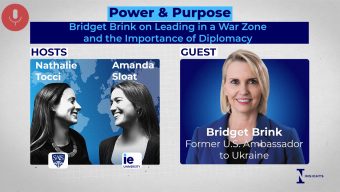Today’s job market presents a paradox. An increasing number of professionals, both young and experienced, possess excellent qualifications – university degrees, foreign language skills, technological proficiency, and solid international experience. Yet despite these impressive credentials, skills that naturally increase a candidate’s expectation of being able to land meaningful and rewarding employment, there remains confusion and frustration amongst professionals as to how to effectively manage one’s career.
This disconnect between qualifications and career is showing itself in the workplace today. There is a concerning combination of high absenteeism and low engagement, pointing to the need for an improved organizational climate, for productivity and well-being. Companies, like workers, are feeling the impact. According to Gallup’s State of the Global Workplace report, only 23% of employees worldwide are engaged, causing economic losses of $8.9 trillion (9% of global GDP).
These challenges can also be considered, however, as unprecedented opportunities for transformation – for professionals and companies. We can still aspire to make an impact in today’s environment, and work towards better alignment with our authentic selves, rather than merely occupying a position to earn a paycheck. As Gartner research indicates, the workplace is evolving away from the historical psychological contract between employee and company.
Today, several essential factors for career advancement have been “democratized,” including access to knowledge, self-awareness, contacts, and capital. These factors, when well-managed, can be what’s needed to advance to the next professional level and increase employability – a key factor for job competitiveness, which is essentially the ability to progress at work and successfully adapt to continuous transformations.
While there are no magic recipes for finding a personalized and non-transferable equation of professional success and fulfillment, certain proven strategies can guide this journey.
Personal Purpose: Finding one’s personal purpose – understanding why we do what we do – is essential to one’s career. The Japanese concept of ikigai, which embodies the idea of “happiness in living” can provide a practical framework for professionals interested in discovering their purpose. As Yukari Mitsuhashi writes, ikigai is “often associated with a Venn diagram with four overlapping qualities: what you love, what you are good at, what the world needs, and what you can be paid for.” Where these qualities converge, professionals can find not just direction for their career but also a sense of personal purpose that can guide them when making important decisions.
Passion plus Perseverance: According to Angela Duckworth, it is grit – the combination of passion and perseverance – that is most essential to professional progress. Duckworth studied a range of individuals in challenging situations – from seventh graders in the U.S. public school system to West Point military cadets – and found that success did not come from pure talent or rational intelligence alone, but from maintaining passion and perseverance over time. This dogged persistence might explain why many self-made professionals and entrepreneurs succeed even when it seems they face insurmountable obstacles: they have the ability to stay focused and passionate about their goals and work.
Six Self-Factors: To manage our career well, we must also be able to manage ourselves well. This includes self-knowledge, self-confidence, self-responsibility, self-development, self-demand, and self-compassion. These six self-factors, once taken in earnest, help us to take ownership of our lives and not fall into victimhood regarding our career and – importantly – develop a professional resilience and winning mindset.
Professionalism and Credibility: Professional credibility comes when one displays competence in a consistent manner, thus establishing trust. It is important to remember that trust is a fragile asset – in any environment – and must be maintained. This helps build one’s influence and advance career-wise because reputation often opens the door to new opportunities.
Healthy Habits: High-performance careers can be quite demanding. And so, it’s important to integrate healthy routines for our body, mind, emotions, and spirit into our day. When we do not support our physical and mental well-being, our daily routines tend to include fatigue, lack of focus, and increased vulnerability to illness – all of which can undermine productivity, decision-making, and overall happiness. Thus, it is important to build habits – healthy eating, exercise, community building, for example – that improve our quality of life and better manage systemic stress. It’s important to note that these habits for high performance cannot be built overnight but must be practiced through daily consistent effort in order to reap the rewards and sustainable results of a long professional career tomorrow, let alone in 30 or even 40 years.
Mentors and Coaches: We cannot go it alone. A successful career journey entails the support and advice of others, from people inside and out of your company and industry. Mentors and coaches, both formal and informal can provide valuable support and guidance – as well as development opportunities. The key is to build rich connections with people who are meaningful for you, your purpose, and your career.
Personal Brand: According to Harrison Monarth, a personal brand is “intentional. It is how you want people to see you. [It] is about visibility and the values that you outwardly represent.” In order to create a compelling personal brand, it’s important to have a good narrative that combines a rational value proposition (experience, knowledge, and results), emotional connection (interpersonal skills and relationship building), and inspirational elements (values, purpose, and desired legacy).
Networking: Transactional relationships may be effective in the short term, but it is best to avoid them when building a professional network. The key success factors in this area are cultivating generosity, adding value, anticipation, patience, and focus. Professionals who want to build their career through networking should take advantage of the current environment’s exponential face-to-face and 2.0 networking opportunities. An active LinkedIn profile is just one example of the impact that can be achieved when creating a symbiotic network of giving value to others.
Cultural Fit: Not every work environment is the right fit for every professional worker. It’s necessary for each of us to identify which work environment – location, energy, hybrid, perks, management structure, for example – will help us shine and do our best work. Professionals should spend some time thinking about the types of environment that are most conducive to bringing out their unique talents.
Continuous Improvement: Healthy ambition, humility, learning agility, and a constant “day one” attitude are all helpful outlooks for pursuing a journey toward career fulfillment that is not easy to achieve, but to which we can aspire. Everything starts with self-awareness. For this, there are many proven tools that can help, including Insights Discovery and the well-used CliftonStrengths (formerly StrengthsFinder) from Gallup.
Career management is both challenging and deeply personal. While the workplace continues to evolve, and so does the relationship between professionals and organizations, career success will be determined by intentional development and authentic growth. By focusing on these key elements – from defining purpose through understanding cultural fit – professionals can build not just better careers, but more meaningful professional lives. The tools and opportunities for one’s career development are more accessible than ever before – it’s up to each of us to choose how to use them. As the great coach Tony Robbins states, “it’s your decisions, not your conditions, that determine your future.”
© IE Insights.











